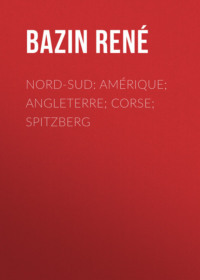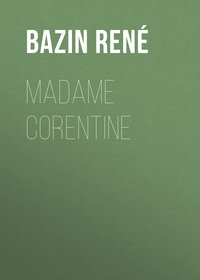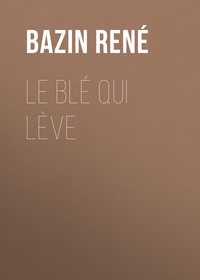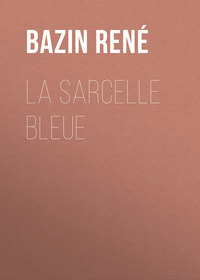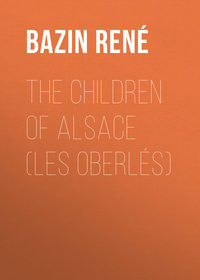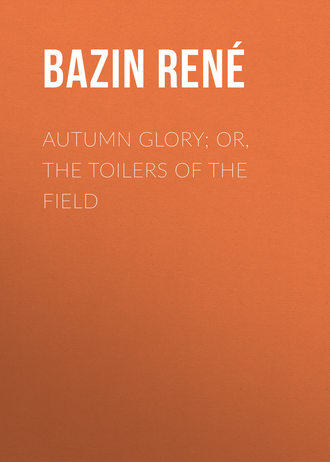 полная версия
полная версияAutumn Glory; Or, The Toilers of the Field
"That's the son from Africa. A handsome lad! How well his blue tunic suits him. And the old man, how happy he looks!"
The farmer sat close to his recovered son. Halfway down the last street, bordered by an elm hedge shedding its leaves on the road, the old man plunged his big hand into his pocket and nudged Driot's elbow to call attention to the two choice cigars he held between finger and thumb.
"With pleasure," responded the young man, and taking one he lit it, somewhat slackening the mare's pace as he did so, then, after a few puffs, as the gorse-covered slopes, golden with blossom, the stony fields, the crown-topped elms, came in sight, bringing with them the sweetness of old familiar scenes, Driot, hitherto somewhat silent and abashed by the attention they had excited, began:
"And all the home-folks, father, how are they?"
A deep furrow lined the farmer's brow. Toussaint Lumineau turned a little in his seat and looked away towards the landscape, distressed at having to tell the trouble, and still more by the fear of what his handsome Driot would think about it.
"My poor boy," he said, "we have only Mathurin and Rousille at home now."
"And François, where is he?"
"Only fancy! Ah! you little think what I am going to tell you. A fortnight ago yesterday he left La Fromentière to work on the railway at La Roche. Eléonore went with him. It seems that she was to keep a coffee shop. Can you believe it?"
"You sent them away from home?" asked the young man, removing the cigar from his mouth and looking straight at his father. "They are not such fools as to have left you for any other reason!"
The words gave the old father a thrill of joy. His Driot understood him; his Driot was at one with him. Returning the frank gaze, he answered:
"No; they are a couple of idlers, who want to make money without doing anything for it … ungrateful, both of them, leaving their old father … and then you know that François loves pleasure. Since he served his time he has always had a hankering after town life."
"I know; and I know that town has its attractions," returned André, touching up La Rousse with the point of the whip; "but to grease the wheels of a railway carriage, or serve out drink! Well, everyone goes his own way in this world. All the better for them if they succeed. But I cannot tell you what the fact of François' going is to me. I was so looking forward to our farm-life together."
He remained bending forward awhile as if only intent on the twitching of the mare's delicate ears, then asked in his caressing voice:
"Things are going badly with us then, father?"
"They have been somewhat, my boy. But they won't now that you are home."
André made no direct reply, nor did he say anything at all just then. He was scanning the horizon for a slate-covered clock tower and certain tree-tops not yet distinguishable in the distance; his heart was already in the old home.
"At any rate," said he, "Rousille is left to us. She had grown a pretty girl when I was last home on leave, very taking, and with a will of her own! You cannot imagine how often I used to think of her when I was out in Africa, and try to sketch her portrait from memory. Is she as jolly as ever?"
"She is not bad," replied the farmer.
"And a good girl, I hope? She is not the sort to turn herself into a barmaid."
"No, certainly not."
The good-looking young soldier slackened the mare's pace, partly because they had reached a turn in the road where there was a steep descent, partly that he might the better see, at the foot of the sloping ground, the Marais of La Vendée opening out like a gulf. He had only been home once before in his three years of service; with growing emotion he gazed upon the groups of poplars and tiny red roofs standing out from the waste of marshland; his eyes roved from one to the other; his lips trembled as he named the farms one by one; all other emotion was silenced in that of coming home again.
"Parée-du-Mont!" he exclaimed. "What has become of the eldest Ertus?"
"Nothing much; he is in the Customs."
"And Guerineau of la Pinçonnière, who was in the 32nd line regiment?"
"Oh, he went off like François; is conductor on the tramway to Nantes."
"And Dominique Perrocheau of Levrelles?"
The farmer shrugged his shoulders with annoyance, for, in truth, it was aggravating to be obliged constantly to answer "Gone – left – deserted the Marais." However he had to say:
"You heard, doubtless, that he gained his gold stripes at the end of his first leave; then he obtained further promotion, and was given some post, I don't know where, as Government clerk. A set of stupid fellows, all of them – not worth much, my Driot!"
"Ah, now I see Terre d'Aymont," cried Driot. "It seems nearer than it used to be; I can distinguish their wind-mill. Tell me, father, there were two of my playfellows there, sons of Massonneau le Glorieux, one older, the other younger than me. What are they doing?"
Radiant, Toussaint Lumineau made reply:
"Both on the farm. The eldest exempted his brother. They are fine fellows who do not mind hard work; you will see them to-morrow at mass in Sallertaine."
With a light, happy laugh the young soldier said:
"Ah, by-the-bye, one must get into the way of attending mass again, I suppose. In the army devotion did not trouble us much. Sundays were rather a favourite day for our chiefs to hold reviews … they don't look at things as you do. But you see, father, I will soon accustom myself to going to mass again – even to high mass – it is not that that will be the difficulty."
"What then, my lad?"
They were both silent for a moment. Another turn in the road had revealed La Fromentière on their left. With a simultaneous movement father and son had risen and were standing almost upright, one hand on the front of the carriage, contemplating the property, La Rousse trotting along, unheeded by the driver.
A great, tender rush of feeling, cruel withal, paled André's face. The land was welcoming a son of its soil; all the scattered recollections of his childhood awoke and called aloud to him; there was not a hillock that did not greet him, not a furze-bush, not a lopped elm but had a friendly look for him. But one and all, too, recalled the brother and sister he would find there no more.
Without turning his eyes from La Fromentière Driot replied, after a silence, and without naming those of whom he was thinking:
"I will go and see them at La Roche … of course I will … but brotherhood is not altogether the same when one has broken from the old place…"
An instant later he was holding Rousille, who had run out into the courtyard to meet him, high in his arms, looking her full in the face, into the very depth of her eyes, with the gaze of a brother whose military experience has made him somewhat suspicious of maidenly virtue; but seeing that her eyes met his in all frankness, but with something of a sad expression, he kissed her, and set her down on terra firma again.
"Always the same, little sister! That's good; but a little sorry at having lost Lionore, eh?"
"You can see that?"
"Ah well! But I have come now. We will try to get on without them, won't we?"
"And I?" put in a thick voice.
The soldier left Rousille, and hastened to Mathurin who was coming towards them; dragging his limbs after him.
"Do not hurry, old man! I must do the running for both; I have sound legs."
Stooping over his crutches, and stroking his elder brother's tawny head, André could find no words of comfort. Coming fresh from a military centre where all was young, active, alert, he could not hide the distress and a certain feeling of horror with which Mathurin's infirmity inspired him. However, compelled by the other's anxious look, which seemed to ask, "What do you think of me? – you who come back, judge – can I live?" he hastened to say:
"My poor old man, I am so glad to find you like this. So you have not got any worse?"
With a shrug of the shoulders, the cripple angrily pushed him away.
"I am much better," he returned. "You will see. I walk more easily. I can stand as firmly as I did three years ago, when I thought I was getting well … and, for a beginning, I am going with you to mass at Sallertaine to-morrow."
To avoid answering, the young soldier turned to meet his father, who, having unharnessed La Rousse, was coming towards them, with happy, smiling face, having eyes only for his Driot come home to him again. The men, one following the other, turned towards the house, and went in; but on this happy day it was the farmer who held back, and the returned son who went first. Alert, interested as on a first visit, rejoiced to be made the object of the eyes and ears of the others, he did not sit down but wandered from room to room, the blue and red uniform an unfamiliar sight in this home of the toilers of the field.
To amuse his auditors he made the old walls ring again with words of command; knocked up against corners to feel the strength of the massive stones; opened the cupboard, cut himself a slice of bread, and tasted it, with a, "Better than the bread of Algiers, my friends. This is Rousille's baking, eh? It is excellent; we shall have a good farmer's wife in her."
Followed everywhere by his father, Mathurin, and Marie-Rose, he went from the house into the stables and barns.
"I do not know these oxen," said he.
"No, my boy, I bought them last winter at Beauvoir fair."
"Well, I'll bet that I can tell their names from their faces. This dun-coloured one, that does not look great shakes, is Noblet, and his companion, the little tawny one, is Matelot?"
"Right," answered his father.
"As for the others, our old ones, they have not changed much, save to put on more horn and muscle. The plough ought to work well drawn by them. Good day, Paladin; good day, Cavalier!"
The good creatures lying in the straw, hearing the young voice that called to them, thrust out their heads, and with their thoughtful eyes followed the young master.
A little further, stooping down, he took up a handful of green forage.
"Fine maize for the time of year," he said. "This must have come from our high land; from La Cailleterie?"
"No."
"From Jobinière then, where not a grain is lost. Here's a good specimen!"
The father was ready to join in praise of his oxen, his fields, everything, so happy was he that the last of his sons, after three years' absence, still loved the ground.
But the handsome young soldier laughed more than he felt inclined to do, to hide the sad thoughts that would come during his round, and when in the shed affected not to see the traps for blackbirds, made by François the preceding winter. In the threshing floor, seeing a bundle of faded grass lying on the neatly made hayrick, he bent towards Rousille, and murmured:
"Did François gather that? Ah, it pains me more than I could have believed, Rousille, not to find François here. It quite changes La Fromentière for me."
But the father heard nothing of this. He only saw that his son was home again, and the future of La Fromentière assured. When they had re-entered the general sitting-room, Lumineau passed his hand over the blue tunic of the Chasseur d'Afrique, saying:
"I like you in this, but I bet anything that you will not be sorry to lay aside your soldier's toggery."
"All right, father," returned André, laughing at the unwitting affront to his uniform, and his father's indirect mode of inviting him to change to civilian dress. "I am not got up in Sallertaine guise; I'll go and change."
From the bottom of the chest in the end room, beside the bed where he was to sleep, André took the carefully folded work-day suit, laid there by him the day he left. He took great pains with the waxing of his moustache, and adjusting the brim of his hat, adorned his button-hole with a sprig of jasmine; then going the length of the house, opened the kitchen door, and there, framed against the old walls, his slim figure clad in cloth suit, was seen the handsomest young Vendéen of the Marais. Bronzed and fair-haired, his joyous face reflected the happiness of the others.
"Ah, Driot," exclaimed the farmer merrily, "now you are quite yourself again! You were my son before, but not so completely my very own as now," then added: "Now come, and we will drink to your health, and that you may stay at La Fromentière; for I am ageing fast, and you shall take my place."
Mathurin, sitting at table beside his father, became very gloomy. When the glasses were filled, he raised his with the others, but did not clink it against that of André.
CHAPTER VIII.
IN THE PLACE DE L'EGLISE
The bells rang out the close of High Mass; choir boys chanted the Deo gratias.
As in its early days, when in the last years of the twelfth century it was erected on the summit of the Isle of Sallertaine, the little church, now yellow with age and growth of lichen and wild-flower, witnessed the crowd of worshippers, dressed in the same fashions as then, pour out from the same doors in the same order and collect in the same groups in the same Place.
The first to be seen were the farm-labourers and farmers' sons, who came out by the east door from the transept where they had heard mass, and who, passing round the choir, grouped themselves on the other side, where the young girls would presently emerge. Two by two they appeared between the pillars of the west porch with eyes lowered to the tips of their sabots. They were well aware that their rosy cheeks, smoothly braided hair beneath the pyramid of muslin, the embroidered stockings peeping under the short petticoat, the manner in which they walked with hands demurely crossed over the moiré aprons, made them the cynosure of all eyes. This retired bearing only lasted for some twenty paces; soon the girls had formed themselves into a group close by the Michelonnes' house, at a short distance from that of the younger men. And now in their turn they waited. Eyes grey, blue, brown, very much on the alert; eyes sparkling with life; eyes in which lived a remembrance. Laughing lips, telling of the mere joy of living; the chirping as of a flock of birds greeting one another. Following them came the farmers and their wives; widows, distinguishable by the band of velvet in front of their coifs; older men, men of position; these all issuing from the nave, among them many a grave face still under the influence of devotion, in which like walking saints they seemed wholly absorbed. Many tall, finely set up men there were, with calm, fresh complexioned faces closely shaven, save for a thin line of whisker. All wore the same costume of black cloth coat with straight collar, trousers with flaps, raised on the ankle by a fold in the cloth, blue or green belt extending half way up the waistcoat, round felt hat bound with velvet. They joined the younger men, swelling the groups that shouldered each other, forming by this time a dark swaying mass reaching to the last buttress of the choir.
The matrons, on the contrary, making a passage for themselves through the crowd, went their way, looking in their plaited skirts like ornamental round towers. From their calm eyes, and the brief smile with which they exchanged greetings with a town acquaintance, it was plain to see that, having outgrown the follies and illusions of youth, each had settled down to her store of domestic happiness, joy, or sorrow that a green patch in the Marais had reserved for her. They talked with other farmers' wives, were joined by one or other for the homeward way, and thus accompanied, dignified and worthy, they directed their steps towards the plain, or to the various boating stages.
Despite their departure, the gathering in the Place grew denser and denser. It was the place of Sunday meeting where for centuries past the dwellers of the marshes, prisoners of the canal-bound land, had been wont to assemble. To them attendance at mass was alike a religious duty and an occasion of social gathering. Before wending their way back to their farms, not a man, even the gravest and most considered among them, would have failed to pass an hour in a wine shop chatting with his friends over a bottle of muscadet and a game of cards, luette particularly, a game imported from Spain in ancient times. Already innkeepers were standing at their doors at the foot of the Place, sounds of merriment and laughter were to be heard from within, and the stock-phrases of luette players, "Your turn." "My turn." "I play a horse." "I take merienne."
Meanwhile there was more than ordinary animation among the girls stationed behind the groups of men. They were scanning all the church doors, whence were now issuing good women, tellers of rosaries, who had lingered long over their devotions.
"He is coming out," exclaimed tall Aimée Massonneau, the daughter of farmer Glorieux, of Terre-Aymont. "Did you see him, that poor Mathurin Lumineau? He insisted upon coming to mass. I am sure he might have got dispensation!"
"Yes," returned the little auburn-haired daughter of Malabrit, "it is six years since he came to Sallertaine."
"Six years – really?"
"Yes, I remember. It was the year my sister was married."
"And why do you think he came?" asked Victoire Guerineau, of La Pinçonnière, a sharp-tongued pretty girl, with a complexion like a wild rose. "For he must have shown some spirit to manage it."
"To stand by his father," said a voice; "the old man had been so saddened by the going of Eléonore and François."
"To show himself with his brother André," put in another. "He's a good-looking fellow is André Lumineau! I should not mind – "
Victoire Guerineau and the others broke into a peal of laughter.
"You are quite out of it. It's for Félicité Gauvrit he came!"
"Oh, oh!" exclaimed those in front.
"How ill-natured you are! If she were to hear you."
And several turned towards the Michelonnes' doorstep, near to which, amid a little throng, stood Mathurin's former fiancée.
Suddenly a murmur ran through the crowd.
"There he is. Poor fellow! How difficult it is for him to walk."
And under the pointed arch of a low doorway, one half of which only was open, a deformed figure was seen struggling to force a passage through the narrow aperture, one hand holding a crutch clutched hold of a pillar outside, by which the poor man strove to drag himself through, but he had only succeeded in freeing one shoulder. With head thrown back, there was an expression of agony upon the face which attested the violence of the effort, and the strength of will that would not give in. Mathurin Lumineau seemed on the point of suffocation; he looked at no one in the throng of people whose gaze was riveted upon him; his eyes on a higher level than those of the spectators were fixed upon the blue vault of heaven with an expression of anguish that re-acted upon them.
Conversation was interrupted; voices began to murmur:
"Oh, help him! He is suffocating!"
Some of the men made a movement to go to his assistance; at that moment, from the gloom of the interior, his father asked:
"Shall I help you out, Mathurin? You cannot squeeze through there. Let me help you."
In a low voice, inaudible to those without, but with terrible energy, Mathurin answered:
"Don't touch me. Confound it! Don't touch me. I will get out by myself."
At length the man forced his huge bust through the door, and with a tremendous effort steadied himself, stroked his tawny beard and settled his hat on his head. Then with the aid of his crutches, standing as upright as he could, Mathurin looked straight before him, and advanced towards the group of men, which opened out silently at his approach. No one ventured to address him, it was so long since he had been among them, the old habit of familiarity seemed lost; but the attention of all was concentrated upon their former comrade, and no one noticed that his old father with André and Marie-Rose were following close behind him.
The cripple had soon reached the spot where the girls were standing. They fell apart even more quickly than the men had done, for they guessed his intention; a lane opened between them reaching up to the houses. At the far end of this living avenue, clad in black dresses and white coifs, standing erect, quite alone, was seen Félicité Gauvrit. She was the one he sought. She knew it; she had foreseen her triumph. No sooner had she observed Mathurin Lumineau sitting on the family bench in church, then she had said to herself: "He has come for me. I will hide away by the Michelonnes' house, and he will follow me." For she was gratified to have it seen that he still loved her, the girl to whom, handsome though she was, no suitors came. The women with whom she had been talking had prudently moved away; she stood alone, under the Michelonnes' window, looking like a lay figure from some museum in her costume of heavy stiff material, the braids of her lustrous brown hair shining under the small coif, her dazzlingly white complexion and uncovered throat. Erect, with arms pendant on either side of the moiré apron, she watched her former lover coming towards her between the double row of inquisitive lookers-on. The many faces bent upon the girl in nowise intimidated her. Perhaps in the suit and cravat Mathurin was wearing she recognised the very ones he had worn at the time of the accident; any way, she remained calm and unabashed, her face even wore a slight smile. He drew nearer, leaning on his crutches, his eyes fixed, not on the path, but on Félicité Gauvrit. What the poor fellow wanted was to see her once again; to make her understand that health was returning, that hope was awakening out of his misery, that the heart of Mathurin Lumineau had never wavered. All this his sad eyes told her as he drew near, offering in piteous pleading the bodily and mental suffering he had endured to her who had been their cause. But his strength was unequal to the effort, he grew deadly white; and when the insolent beauty, the first to speak, said calmly before all the throng:
"Good day, Mathurin," he could not answer. To have seen the smile on those rosy lips, to be so near to her, and to hear her address him in the same easy tones as if they had but parted the day before, was more than he could bear.
He grew faint, leant heavily on his crutches, and slightly turned his tawny head to Driot, who was behind him, as if to say: "Take me away," and the younger brother understanding the appeal, passed the suffering man's arm under his and led him away, saying as he did so, to divert the attention of the crowd:
"Good day to yourself, Félicité. It is an age since I have seen you. You are not a bit altered."
"Nor are you," she retorted.
A few laughed; but among those assembled there were many who were deeply touched, even disposed to tears. Some of the girls of Sallertaine pitied the poor fellow so exhausted and confused, led away on his brother's arm; they sorrowed that he could never enjoy that love which each, in the recesses of her heart, hoped some day to share with the yet unknown swain. One of them murmured:
"It is not only in body that he is afflicted, his mind, too, seems gone, poor fellow!"
Many women, mothers going home with their children, walked more sedately as they saw the group on the way to Chalons: old farmer Toussaint, André and Mathurin, with Marie-Rose bringing up the rear. They recalled with a shudder what a magnificent youth the poor cripple once had been, and thought: Heaven send that no such calamity befall our boys when they grow up!
Félicité Gauvrit began to be affected in her turn, but in a different manner. The departure of the Lumineaus had turned attention away from her. Some of the men surrounded the district crier, who was calling out the list of lost articles and farms to be let; others repaired to the inns. The girls collected in little companies to seek the homeward way. Every minute five or six white coifs were to be seen bowing and bending in farewell salute, separating from the others, and going off to the right hand or the left. Félicité, left alone for some minutes, joined one of the groups going west of Sallertaine, towards the high Marais; she was received with some embarrassment, as one whom they did not want to fall out with, yet who was somewhat compromising, and whose company their mothers did not desire for them.
Young men drinking together in the inns called after her the slighting remarks men make on girls for whom they have little respect. She did not answer them back, but with her companions descended the hilly road bordered with houses, and thence on to the open Marais in the direction of Perrier.




